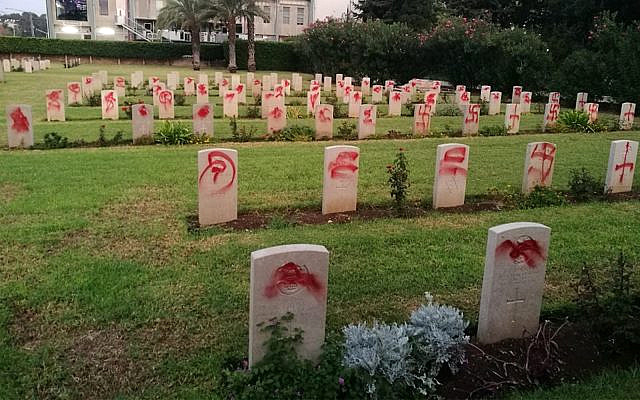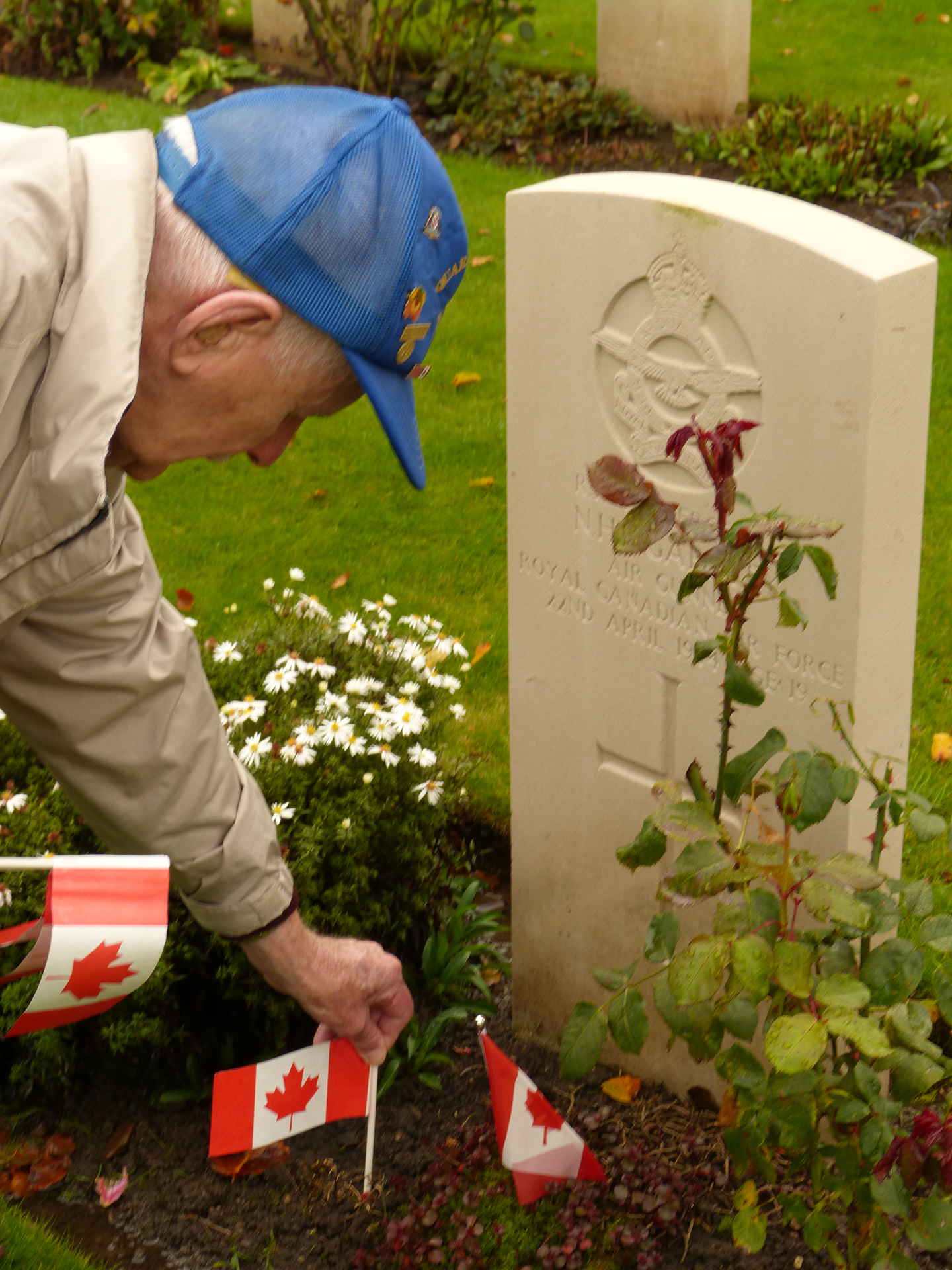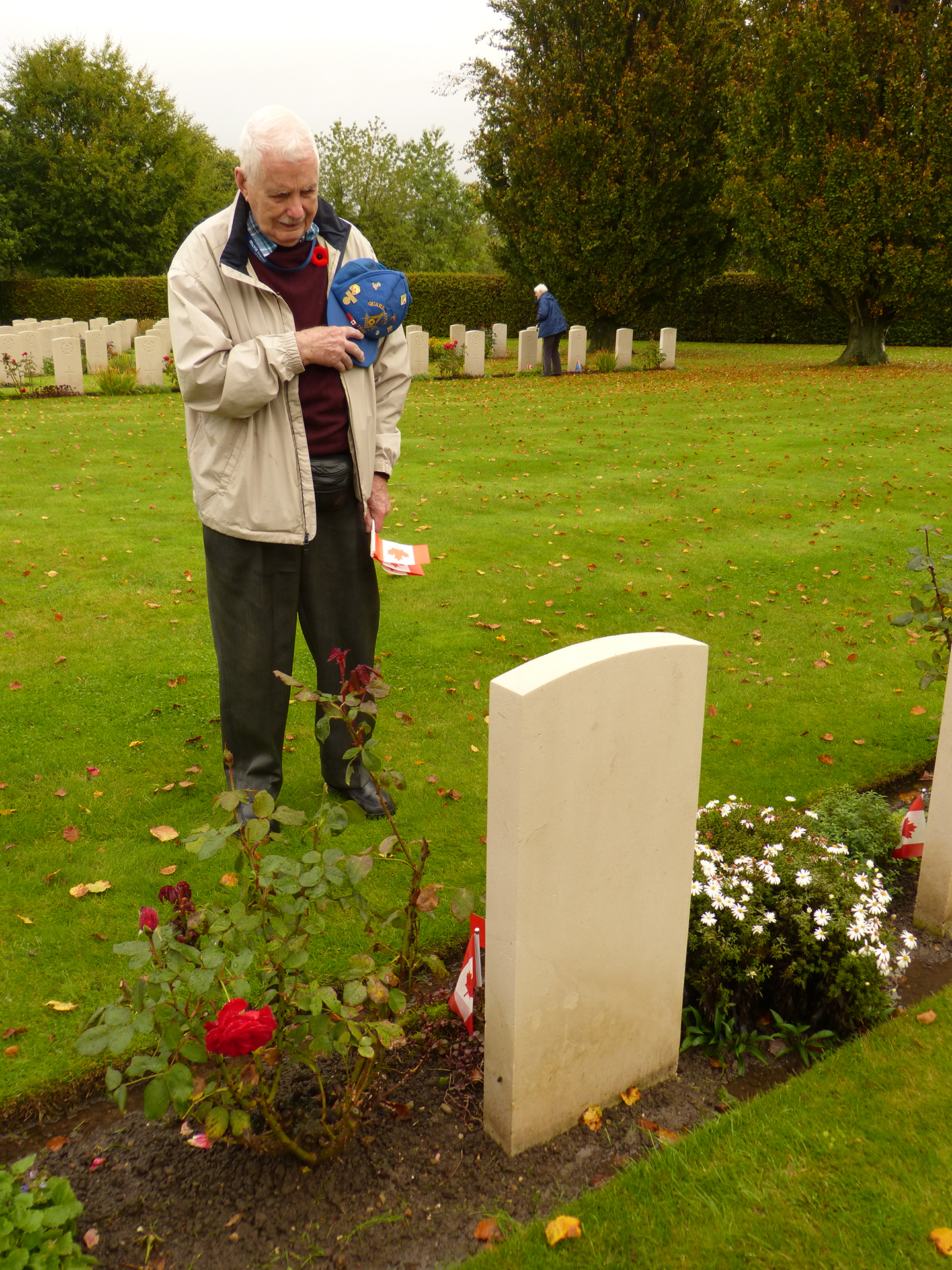
The images penetrated right to my core. I felt angry and hopeless both at the same time. Last week, a dear friend forwarded digital photographs she’d received from overseas. The pictures showed tombstones of fallen First and Second World War soldiers pushed over and spray-painted with swastikas.
A poignant quotation accompanied the images from the Commonwealth War Graves Commission (CWGC) cemetery in Israel.
“Why would someone want to cause pain in a place like this?” the caretaker of the cemetery said to the Times of Israel reporter.
You’ll recall, last week, I myself was travelling in Britain with a group exploring the history of Canadian airmen at bases in northern England during the Second World War. Among those accompanying me on the trip, I wrote last week, was Roger Parliament, a 96-year-old former instrument technician, who’d served in the Royal Canadian Air Force across Europe during the war.
But I didn’t have the heart to show him the swastika-stained grave stones in Israel. I couldn’t allow myself to hurt this man who’d seen too many of his comrades leave those Bomber Command air bases and not return.

In fact, at one point during our travels, I brought our group to the CWGC cemetery at Harrogate, just west the City of York, England. At one point, during our stop, I came upon Mr. Parliament. He was on his knees placing a paper Maple Leaf flag in front of a tombstone. The stone commemorated an RCAF air gunner named Neville Garrity, who’d died when the bomber in which he served crashed into a second bomber returning from operations over the continent.
“Royal Canadian Air Force air gunner,” was all the inscription said along with the date of his death and his age, “April 22nd 1944. Age 19.”
Mr. Parliament then stood before the grave, took his baseball cap off, saluted and stood silently as I approached. Then, he blurted out his thoughts: “Just 19, a kid,” Roger said. “He died for you and me.”
I put my arm around Roger’s shoulder and agreed. But I just couldn’t tell him about the photos I’d seen from that defaced Israeli cemetery. Nor could I explain the countless other acts of disrespect I’ve witnessed toward veterans over the years – the muggings, theft of their poppy boxes, and total disregard for their wartime service.
It seemed that Roger’s genuine feeling of hopelessness in front of that 19-year-old’s grave at Harrogate would be the lasting impression of his travels through England with me.
Then, on Saturday, our tour came to an end. Our last stop would be Heathrow airport west of London. All of us on the tour felt weary and emotionally drained from the visits we’d made to cemeteries, war memorials, museums and derelict airfields. And as we filed into the busy Heathrow terminal, I dashed ahead to the Air Canada ticket desk with a special request.
“I have a Canadian veteran in my group,” I began. “Would there be any chance, if a seat in business class wasn’t filled, that this former RCAF airman from the War could enjoy the upgrade?”
The ticket agent looked at me as if I had two heads. Why would she allow a passenger an upgrade without paying for it? And as much as I tried to explain to this young person the significance of a surviving WWII veteran actually travelling on one of their flights, I kept hitting the wall.
Then, once I got past the baggage drop-off, and the security lines, I approached the ticket agent at the Air Canada gate with a similar request. “You want an upgrade for free?” the agent asked rhetorically.
I nodded. He shook his head. And I sensed any opportunity to give Roger Parliament one last perk on our commemorative trip was evaporating.
Finally, as we made our way down the gangplank to the aircraft, I spotted an Air Canada attendant wearing a name tag that said, “Service Director” on it. I made one final plea for a seat upgrade for this deserving Second World War veteran. I spotted her name on her tag and finished by saying, “Heather, you’d make a deserving vet very happy.”

She smiled and said she’d see what she could do. I filed to my economy seat, stuffed my carry-on into the overhead bin and forgot about my last-ditch plea. Then, Heather suddenly appeared at my seat. “We moved Mr. Parliament up front,” she said. And I fist-pumped with joy. When we landed at Pearson, Roger was bubbling with excitement.
“I was right up at the front in First Class,” he said. “The pilot even came out and shook my hand.”
I still couldn’t bring myself to tell Roger about the cemetery in Israel. But I was heartened that at least some time, people in power can put gain and protocol aside, and demonstrate respect for the selflessness of a man who’d served all of us a generation ago.